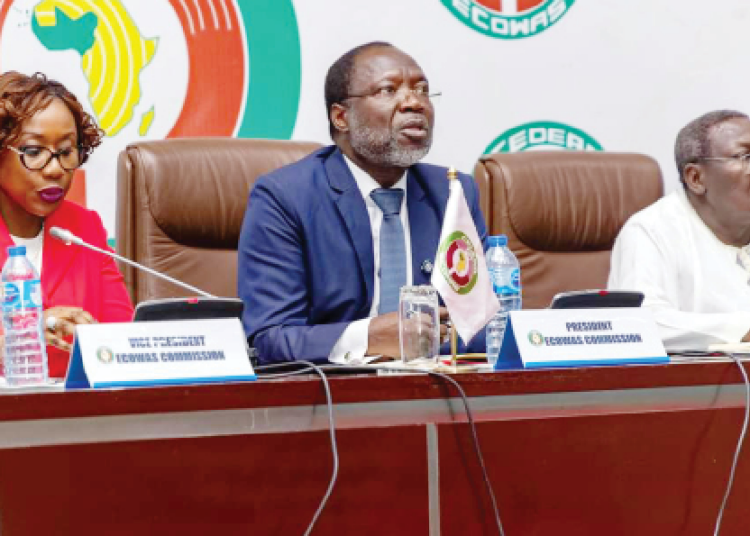The Economic Community of West African States (ECOWAS) appears determined to address the challenges hindering trade volume among community member states, which is unfortunately low in recent times amid other impediments.
At the moment, trade volume amongst member states in the region is just 12% as the current political situation within the community has overshadowed the efforts of ECOWAS at addressing the needs of citizens of the community.
During a conference to commence a weekly media engagement aimed at giving maximum publicity to ECOWAS activities in Abuja, President of the ECOWAS Commission Dr. Omar Touray said that the current low volume of trade among member countries of the regional bloc is a disturbing situation that needs to be addressed.
Touray equally lamented the trade volume within the African continent which he said is lower than 20% saying that despite some achievements made, “the region’s relentless march towards an economic union has been overshadowed by contemporary political developments.
“At the moment, our intra community trade stands around 12%.”On the whole in Africa, intra continental trade is under 20% which is extremely low.”
Comparing trade amongst African countries, Touray said “If you look at developed countries that are sufficiently integrated or regions that are sufficiently reintegrated, intra continental trade alone is around 60 to 70%.
“So we have a long way to go. Very long way to go and this is why it is important that we open our markets for our own produce, our own manufactured items.”
Touray also noted that ECOWAS’ major success story was that over the last 49 years, it had been able to unite its 15 -member states around its common objectives of socio-economic development through regional integration.
He said: “As captured in Article 3 of the ECOWAS Revised Treaty, Member States have committed themselves to the promotion of integration, leading to the establishment of an economic Union in West Africa in order to raise the standard of living of its peoples.
“And, to maintain and enhance economic stability, foster relations among the Member States and contribute to the progress and development of the African continent.”
The fundamental objective of the Community which is the promotion of the region’s socio- economic development through integration and cooperation in different spheres involves issues such as trade, free movement, agriculture, industrialization, energy, science, education and technology towards the creation of an economic union.
In order to create a single market of the region, the ECOWAS Trade Liberalisation Scheme introduced in 1979 might just increase activity in the trade in unprocessed goods and traditional handicrafts free of any restrictions, tariff, quotas and any encumbrances. This has been complemented by a Common External Tariff (CET) to promote smoother trade flows.
Additionally, the Community is building and interconnecting regional infrastructure and policies for its physical integration such as railways, highways and airways namely the Abidjan-Lagos corridor road project which is the busiest economic corridor in the region and which is being extended to connect Abidjan and Praia via The Gambia, Guinea Bissau, Guinea, Sierra Leone, and Liberia.
On energy, Dr Touray said major projects are being unfolded while a regional energy market has been developed under the aegis of the West African Power Pool (WAPP) which coordinates the sale and purchase of electricity. He further added that electricity projects have been developed some of which link Benin, Ghana, Cote d’Ivoire, Guinea, Liberia, Sierra Leone and Togo.
However, one of the immediate challenges facing the community is the food crisis. Although the Commission has provided support to Member States to respond to food crises since 2016 when ECOWAS established a Regional Food Security Reserve that member states in difficult food and nutrition situations can draw on, there are still challenges of food insecurity in the region.
For instance the United Nations World Food Programme (WFP) has warned about acute food shortages in the region with Nigeria, perhaps facing the biggest threat in 2024.
Nigeria is grappling with its fourth consecutive year of chronic food insecurity with 26.5 million people across the country projected to face acute hunger during the 2024 lean season between June and August according to the November 2023 Cadre Harmonisé food security analysis.
In West and Central Africa, nearly 50 million people will suffer food insecurity between June and August 2024 – a four percent increase compared to 2023, according to the WFP.
ECOWAS must therefore address the financial constraints hindering its humanitarian efforts at solving the crises of food insecurity and malnutrition in the region.











